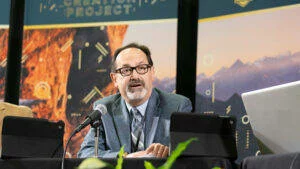A study in genomic sciences that was on most counts not newsworthy has made big headlines in recent days, both in the media’s initial declarations and in the ensuing reaction. The cynic in me suspects that the whole thing was predictable from the very get-go.
The study, published in The American Journal of Human Genetics, compared genetic material from 99 modern-day Lebanese with what they could recover from 3,700-year-old burial remains from Sidon. Sidon was a I’m interested in what the playing out of the controversy tells us about how we think and talk about science and faith issues in our culture.major Phoenician city of the ancient world, and its inhabitants can be properly called Canaanite. (Everyone who studies ancient Near Easter languages and cultures knows this; we’ve read the inscriptions. The only debate is whether the people at Ugarit, a bit farther north, are properly called Canaanites.) Based on these comparisons, the study concluded that (at least some of) the modern Lebanese appear to have Canaanite ancestry.
So far, so good. In fact, it’s more than that—it’s cool. I’ve been to the Middle East, have noticed differences between the various groups that we call “Arabs,” and have wondered about just such things as their lines of descent. But trouble seems to follow the cool stuff, as the sparks fly upward. A controversy arose; but that is not my subject. I’m interested in what the playing out of the controversy tells us about how we think and talk about science and faith issues in our culture.
A (Surprisingly) Unified Story
The science paper had said, “the Bible reports the destruction of the Canaanite cities and the annihilation of its people; if true, the Canaanites could not have directly contributed genetically to present-day populations” (p. 2 of the pdf, col. a). (I’ll come back to this.) When it came time to report these findings to the general public, this notion became the most prominent, not only in the headlines (produced by the editors, I suppose), but also in the stories’ texts themselves.
For example, the online journal Cosmos (Australian, popular science reporting) for July 28 ran a report under the headline, “DNA vs the Bible: Israelites did not wipe out the Canaanites.” The reporter, Andrew Masterson, added details, such as, “The Bible is full of references to the need for the Canaanites to be driven out of Canaan, Fascinatingly, so many different reporters and editors spun the scientific report the same way, namely that science has contradicted and disproved the Bible.the land promised to the Israelites, because they ‘served Baal and the Ashtoreths’ (Judges 2:13) and were also generally in the way.” Bryan Nelson, writing for the Mother Nature Network on July 27, wrote, “In the Hebrew Bible, the Canaanites are a group of people who once inhabited the Southern Levant and are credited with constructing the first alphabet before eventually being systematically annihilated by the Israelites.” The title of that articles was, “New DNA study casts doubt on Bible claim: Modern-day Lebanese are descendants of the Canaanites, proving that they weren’t wiped out after all.”
Not to be outdone, the UK’s Independent reported on July 27, “Bible says Canaanites were wiped out by Israelites but scientists just found their descendants living in Lebanon.” Ian Johnston, the science reporter, took the trouble to add, not simply a reference from the book of Joshua (reporting the Israelites’ success), but also a lurid quotation from Richard Dawkins calling the God of the Hebrew Bible “a vindictive, bloodthirsty ethnic cleanser … a genocidal … megalomaniacal, sadomasochistic, capriciously malevolent bully.” His story actually shows more depth than most, acknowledging both textual variance and interpretive nuance:
While the Bible says they were wiped out by the Israelites under Joshua in the land of Canaan, later passages suggest there were at least a few survivors. Some Biblical scholars have argued the passages describing the Canaanites wholesale destruction are hyperbole, and the genetic research would indeed appear to indicate the slaughter was much less extensive than described.
Well, this is just a sampling. David Klinghoffer (The Discovery Institute), “For Culturally Illiterate Science Reporters, Canaanite DNA Yields Occasion to Slap Bible Around,” drew up an extensive (but partial) catalogue of the stories. Fascinatingly, so many different reporters and editors spun the scientific report the same way, namely that science has contradicted and disproved the Bible.
Retractions, All Around
Of course, these claims are wrong. It’s explicit in the Bible that the Israelites did not take Sidon. It’s also plain that they didn’t even wipe out the Canaanites in the territories they did conquer—sometimes this was a failure, and sometimes this was actually divinely-approved, as in the case of Rahab and her family (I would argue for other cases, but let’s leave that aside for now). Most people recognize the difference between a command and the narrative of the performance of the command, and some reporters oddly overlooked this distinction. So, showing that modern-day Lebanese descend from “Canaanites” is hardly a problem for the Bible!
It didn’t take long before people with more adequate Bible knowledge called out the news reports for their inaccuracies. David Klinghoffer’s afore-mentioned response (taking a break from his normal duties at the non-sectarian Discovery Institute) is exemplary, There can be no doubt that the headline writers, and many of the reporters, got it wrong—and that they could easily have saved themselves the egg-on-the-face experience by asking someone who reads the Bible.as is the response by Timothy LeCroy, a scientifically-literate Presbyterian pastor in Columbia, Missouri. Some of the other responses displayed an (understandable) annoyance by what they saw as unjustified spin and also failure to read the Bible; they placed the episode into the unfolding culture-war narrative. This reading was not without its foundation, and some of the respondents were more than annoyed. I am not going to cite them (if you search for them you are responsible).
Some outlets adjusted their headlines (and occasionally their texts) in light of the pushback. For example, in the Telegraph (surprising for this venue) of July 27, the original headline was, “Study disproves the Bible’s suggestion that the ancient Canaanites were wiped out.” Chris Graham, the reporter, cites the command in Deuteronomy (20:17) to eliminate the people of Canaan, and remarks, “It seems they didn’t destroy them all, though.” In the edition dated July 28, the headline is more modest: “Study shows ancient Canaanites survived divine call in Bible for them to be wiped out.” The story has also been amended and the editors have added a note to indicate the changes: “Correction: The original version of this story erroneously said the Bible claimed the Canaanites were wiped. However, elsewhere in the Bible, it says the elimination was not successful.”
There can be no doubt that the headline writers, and many of the reporters, got it wrong—and that they could easily have saved themselves the egg-on-the-face experience by asking someone who reads the Bible. I will leave it to the journalists’ profession to improve how they do these things. Others (preferably journalists themselves) can explore why this was so easy a trope to resort to; I’d like to explore something else.
Some Reflections on Science-Faith Discussions
From a socio-cultural point of view, the whole episode is instructive regarding the larger matter of science-faith discussions in our culture. Some of the fascinating issues are:
1. The authority attached to scientists, even when they comment
outside their proper discipline
It was the scientific paper itself that raised the question of the Bible (see above). Oddly, in an extensively footnoted paper, they offer no Biblical references. The journalists took that up for themselves; but they (or their editors) didn’t think it worthwhile to question the scientists’ premise. The members of the scientific team have impressive credentials and institutional affiliations, but not a single one of them (so far as I can tell) is qualified in Ancient Near Eastern or Biblical studies. (The same would apply to Alan Cooper, cited in the Australian ABC story.)
Science and scientists serve a valuable role in our culture. But we do a disservice, both to them and to our own intellectual responsibilities, when we attach an authority to them beyond their discipline. Poor Stephen Hawking is being treated as an oracle on all manner of things besides mathematical physics! C.S. Lewis addressed the way in which certain scientific people were given too much deference in ethical discussions about vivisection (God in the Dock, 315):
Now I dread specialists in power because they are specialists speaking outside their special subjects. Let scientists tell us about sciences. But government involves questions about the good for man and justice, and what things are worth having at what price; and on these a scientific training gives a man’s opinion no added value.
A lab coat adds no extra oomph to anyone’s pronouncements about the Bible!
2. The apparent felt need to say something about the Bible, even when it’s extraneous to the actual scientific study.
I find it unfathomable that anyone in the original scientific paper thought it necessary to take up space saying anything about the Bible, other than the connection between Sidon and the Canaanites. I can guess all kinds of motivations, but I don’t want to. Did someone decide that this added a little extra appeal to an otherwise dull paper? Or perhaps it has social relevance? Or it takes a dig at traditional belief (how is that a scientific good?)? Or . . . ?
We all know that it’s impossible to bracket out who we are from what we do in science (let alone in humanities scholarship)nor should we want to do so. But good people have spent a lot of time discussing how to do that well. Apparently their thoughts do not get wide exposure, and we would profit if they did.
3. The way in which journalists followed suit, with no independence from one another.
I can’t be the only one who found it interesting that the journalists all seemed to be singing the same tune in reporting this story. How does that happen? That’s a real question, mind you: I don’t attach much credence to conspiracy theories, but somehow, the stories by so many different writers are so similar. I am sure that journalists prize independence and curiosity just like they say they do; but what forces led to the overriding of these virtues?
Perhaps the most startling thing of all is that, in such an obvious blunder, there was apparently no one with an effective (or attended-to) voice all along the way to call the stories’ spin into question. Did no editor or reviewer of the original paper ask the authors to take this out, since it adds nothing to their scientific argument or results?Perhaps the most startling thing of all is that there was apparently no one with an effective (or attended-to) voice all along the way to call the stories’ spin into question. Did no editorial assistant point out the obvious flaws of the Biblical bashing? Were they ignored—or worse, were they intimidated into silence? I have no idea. But surely journalists can see why folk would be curious about the matter, and might start forming theories of their own? Might there not be some room for reflection and repair here?
I don’t hate journalists, and I don’t suspect them of dishonest means and malevolent purposes. At the same time, they’ve clearly goofed up big time here. Whether their profession can learn anything from this is up to them. But the rest of us can learn a thing or two about critical thinking, about how to reason with the Bible amidst the various claims made about it. When someone tells us that science has disproved the Bible, we really need to ask some questions: Which science? Which scientists? How secure are their results? Do they oppose “the Bible” as a whole, or some passage? And do they oppose that passage as such, or a particular reading of the passage? Was that a good reading to begin with? Might it be the case that the result helps us to read the Bible better? And, oh yes, a reminder: lurid headlines are there to get our attention—they are no substitute for solid argumentation.








Comments
Be the first one to make a comment!